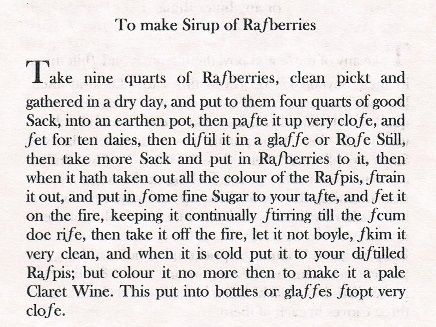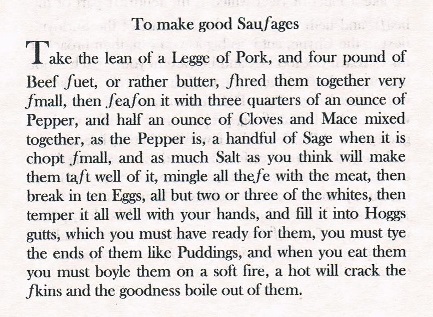- Vizzer wrote:
- Eating a sausage with bread is such an obvious meal. Whether it’s a white bread roll for a hot dog or a crust of granary wholemeal for a sausage sandwich, people must have been eating similar for centuries. Yet reference to sausages (let alone sausage sandwiches) in the English language is surprisingly sparse. Neither Geoffrey Chaucer nor William Shakespeare mention sausages in their writings. Nor is a recipe for sausages to be found in Richard of Bordeaux’ Forme of Cury.
The
Forme of Cury was written in about 1390 and is generally attributed to the master cook (or cooks) who served king Richard II of England, or Richard of Bordeaux as you call him. It thus gives recipes for fancy royal food rather than for common fare and so that's probably why it makes no mention of any sort of sausage. Nevertheless two centuries earlier, Alexander Neckam's two-volume encyclopedic work,
De utensilibus (on utensils) and
De naturis rerum (on natural things) - both written in about 1190 - mention sausages in terms that are still recognisable today. In
De utensilibus, amongst a dictionary of Anglo-Norman cooking terms and the words for various items of kitchen equipment, he refers to
"andulyces, saucistres et pudingis" - that is andouilles, sausages and puddings. The word 'sausage' is derived from Norman-French, although essentially it come from Roman Latin, meaning just something 'salted' and so it actually has much the same origin as 'salad'. In England after the fall of Rome 'pudding' was often the local term and hence why it has remained, at least regionally, the usual name for many of the plumper types of sausage, such as haggis, white puddings and blood pudding.
Incidentally Alexander Neckam in
De utensilibus seems to be the first European writer to refer to the Chinese invention of using a magnetised iron needle floating in a bowl of water as an aid to navigation, and moreover his description is written in such a way as to suggest that this wasn't a particularly new discovery but was already known to many European mariners of the time. Neckam shared his birthday with Richard I, and his mother, Hodierna of St Albans, was hired by the royal household of Henry II to serve as a wet nurse for the future monarch. As a result Alexander was raised as Richard's foster-brother in their early years and he eventually rose to become Abbot of Cirencester.
Although sausages aren't mentioned by name in the
Forme of Cury, it does still contain many recipes for similar, finely-chopped meaty foods, such as haslet (
hastelete), brawn (
braun or braon), rissoles (
ruscheues, ruschewys or raysols) and fried meatballs (called
pompes or pommedorrys, from pommes dorées, ie 'gilded apples'). Meanwhile recipes for haggis (
hagws of a schepe) are given in the
Liber Cure Cocorum and in the Austin manuscript which both date from about 1430.
- Vizzer wrote:
- I don’t know what ‘raspberry sack’ is (a liqueur or a punch presumably) but it sounds like a ghastly thing with which to wash down sausages.
I think 'Rasberry Sack' must have been a bit like the French cocktail, kir, which is made by adding crème de cassis (blackcurrant liqueur) to white wine, or to champagne for kir royale. Alcoholic fruit-based 'cordials' were all the rage in Pepys' time. Here's a recipe for raspberry sack from
The Queen's Closet Opened which was published in 1655 by "W.M." who is usually taken to be Walter Montague, the confessor and almoner of Queen Henrietta Maria, the exiled widow of Charles I.

But since this is a thread primarily about sausages, here also is Walter Montague's recipe for 'good' pork sausages. Note how they are intended to be boiled, like hotdogs, rather than grilled or fried, because as he says they'd be liable to split.

The ancient Romans were also partial to sausages with several classical authors making reference to Lucanian sausages amongst other specific types. A fondness for Lucanicas was supposedly brought back to Rome by soldiers who had served in Lucania (a region in the 'heel' of Italy) probably around the time of Cato the Elder, while the name is still reflected in the modern Greek word for a sausage, λουκάνικο (loukaniko). Peppery and spicey these Roman Lucanicas were a preserved smoked sausage that could be eaten without further cooking, or might be boiled or grilled, and were often sold (either hot or cold) by street-vendors. Seneca (AD 4-65) in one of his letters to his friend Lucilius (Letter No.56) complains about the noise from the street outside his apartment window:
"Then the cake-seller with his varied cries, the sausage-man, the confectioner, and all the vendors of food hawking their wares, each with his own distinctive accent.".
Here's an old recipe for Lucanian sausages from
De Re Coquinaria (on Cooking) by the fifth century writer, Apicius.
 Lucanican sausages are made in the same way as above [the previous recipe for blood sausage stuffed in a pig's intestine]. Grind pepper, cumin, savoury, rue, parsely, condiment [an unspecified mix of dried herbs and spices] bay berries and garum [the ubiquitous Roman fermented fish sauce]. Mix this with well minced pork then knead the mix again to a uniform consistency. Mix with garum, whole pepper-corns, a good deal of fat and pine kernels. Stuff into a pig's intestine and pull this thin then hang like this in the smoke above the fire.
Lucanican sausages are made in the same way as above [the previous recipe for blood sausage stuffed in a pig's intestine]. Grind pepper, cumin, savoury, rue, parsely, condiment [an unspecified mix of dried herbs and spices] bay berries and garum [the ubiquitous Roman fermented fish sauce]. Mix this with well minced pork then knead the mix again to a uniform consistency. Mix with garum, whole pepper-corns, a good deal of fat and pine kernels. Stuff into a pig's intestine and pull this thin then hang like this in the smoke above the fire.Going back still further the Greek dramatist Epicharmus of Kos in about 500BC wrote a comedy titled
Orya (usually translated as 'The Sausage' although I think it might originally have meant something more like a burger or kofte), while Aristophanes' 424BC satirical play
Hippeîs (The Knights) has as its antihero a lowly sausage-seller who manages to win the confidence and approval of the People (the Demos) and so gets elected leader. There's even a 2000BC Akkadian cuneiform tablet from Mesopotamia that records a dish of intestine casings filled with some sort of forcemeat stuffing.
